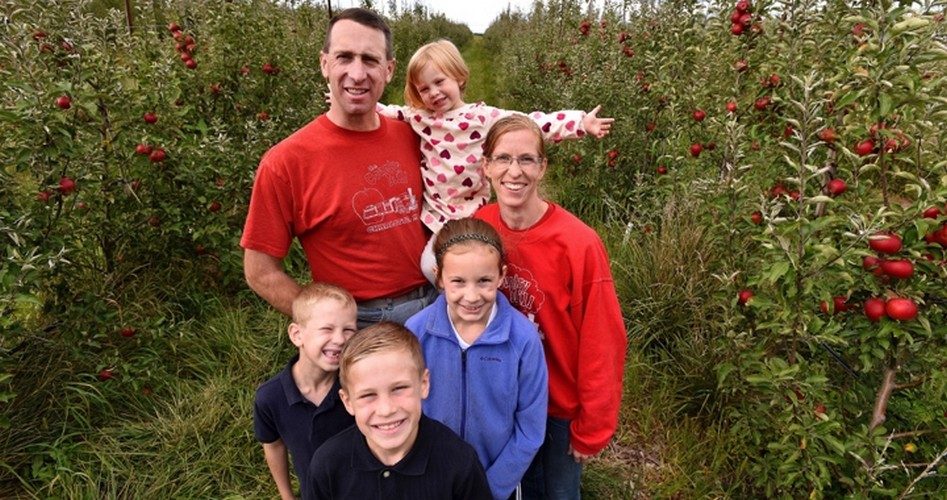
A federal judge has ruled against the city of East Lansing, Michigan, which banned a local farmer from the city’s farmer’s market over his Christian beliefs about marriage.
Steve Tennes, owner of Country Mill Farms, had been selling his orchard’s fruit and other goods at the East Lansing farmer’s market for several years, and had by all accounts been a popular vendor with customers.
But in August 2016 Tennes took to Facebook to explain that because he and his family were Christians and believed that marriage only exists between a man and a woman, he would not host same-sex “marriage” ceremonies at his orchard, a popular local wedding venue.
When East Lansing officials found out about the post, they first asked Tennes not to appear for the next farmer’s market, claiming concerns over possible protests if he showed up. When Tennes set up shop anyway (no protests occurred), city officials took the next step of denying his application for the 2017 farmer’s market, citing the city’s anti-discrimination ordinance. They even went as far as to change the farmer’s market contract to require that vendors follow the city’s ordinance against discrimination based on sexual orientation, gender self-identity, and gender expression. Although Tennes’ orchard is 20 miles from East Lansing, making his wedding policy outside the city’s jurisdiction, officials still banned him from the farmer’s market.
With the help of Alliance Defending Freedom (ADF), a public policy law firm that specializes in First Amendment and religious liberty issues, Tennes sued the city for discriminating against him solely for his religious convictions. “True tolerance is a two-way street,” Tennes said. “The government should not eradicate people of faith from the marketplace.”
The city, however, refused to budge, attempting to have the lawsuit dismissed. “They can say whatever they want,” said East Lansing Mayor Mark Meadows, “but their corporation needs to act in a certain way to qualify to sell products at the East Lansing Farmer’s Market on publicly owned land.”
But on September 15 Federal Judge Paul Maloney (U.S. District Court for the Western District of Michigan) ruled in favor of Tennes, granting a preliminary injunction on the basis of Tennes’ likely victory in the lawsuit.
“The City of East Lansing must grant Country Mill Farms any necessary license and allow Country Mill Farms to sell its goods at the East Lansing Farmer’s Market for the remainder of the 2017 season,” wrote Maloney in his ruling. “The City of East Lansing may enforce the vendor guidelines against Country Mill Farms, with the exception that Country Mill Farms may not be found in violation of the guidelines for declining to host same-sex wedding ceremonies at the Country Mill Farms.”
In his ruling Malone noted that evidence existed that “the City amended its vendor guidelines and then used the changes to deny Country Mill’s vendor application. There exists a substantial likelihood that Plaintiffs will be able to prevail on the merits of their claims for speech retaliation and for free exercise of religion.”
ADF legal counsel Kate Anderson praised the ruling, saying that “just like all Americans, a farmer should be free to live and speak according to his deeply held religious beliefs without fear of government punishment. As the court found, East Lansing officials changed their market policy to shut out Steve because they don’t like his Catholic beliefs regarding marriage. The court was right to issue this order, which will allow Steve to return to the 2017 farmer’s market while his case moves forward.”
The Detroit News reported that Tennes is back at the East Lansing farmer’s market, with the majority of the public happy that he is once again selling his produce there. “Tennes has received positive feedback from around the country — including from people who don’t agree with his beliefs but recognize his fundamental right to have them without fear of retribution from the government,” reported the Detroit newspaper. “‘The last thing we need is for the government to target us for what we believe,’ Tennes says.”
Fellow farmer’s market vendor Drew Kuhlman agreed, telling a local television news reporter that “we’re kinda just buying food here, and if you know what they’re doing and you agree with them or don’t agree with them, don’t buy their products. But they’re not promoting marriage or not marriage or whatever here, so it just kind of seems a little extraneous.”
Photo of Tennes family in their orchard: AP Images


